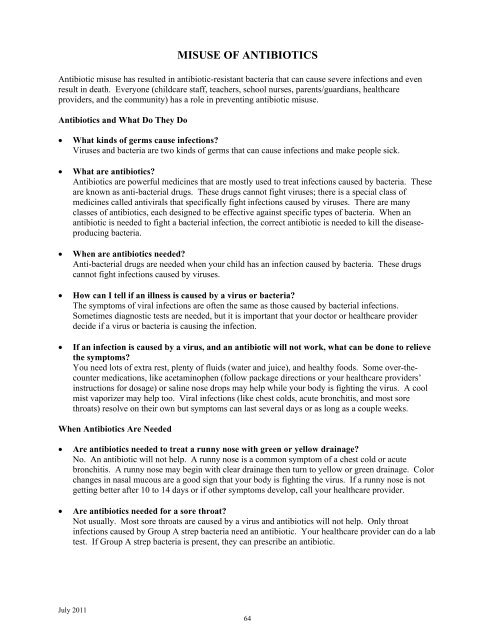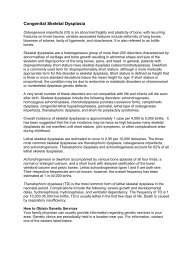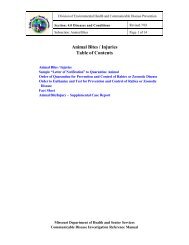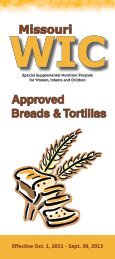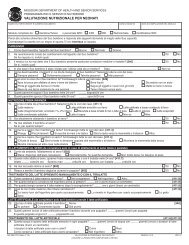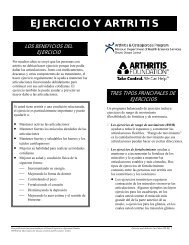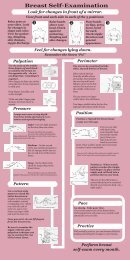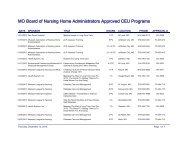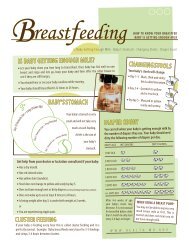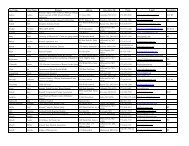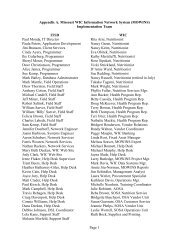Prevention and Control of Communicable Diseases - Missouri ...
Prevention and Control of Communicable Diseases - Missouri ...
Prevention and Control of Communicable Diseases - Missouri ...
You also want an ePaper? Increase the reach of your titles
YUMPU automatically turns print PDFs into web optimized ePapers that Google loves.
July 2011<br />
MISUSE OF ANTIBIOTICS<br />
Antibiotic misuse has resulted in antibiotic-resistant bacteria that can cause severe infections <strong>and</strong> even<br />
result in death. Everyone (childcare staff, teachers, school nurses, parents/guardians, healthcare<br />
providers, <strong>and</strong> the community) has a role in preventing antibiotic misuse.<br />
Antibiotics <strong>and</strong> What Do They Do<br />
� What kinds <strong>of</strong> germs cause infections?<br />
Viruses <strong>and</strong> bacteria are two kinds <strong>of</strong> germs that can cause infections <strong>and</strong> make people sick.<br />
� What are antibiotics?<br />
Antibiotics are powerful medicines that are mostly used to treat infections caused by bacteria. These<br />
are known as anti-bacterial drugs. These drugs cannot fight viruses; there is a special class <strong>of</strong><br />
medicines called antivirals that specifically fight infections caused by viruses. There are many<br />
classes <strong>of</strong> antibiotics, each designed to be effective against specific types <strong>of</strong> bacteria. When an<br />
antibiotic is needed to fight a bacterial infection, the correct antibiotic is needed to kill the diseaseproducing<br />
bacteria.<br />
� When are antibiotics needed?<br />
Anti-bacterial drugs are needed when your child has an infection caused by bacteria. These drugs<br />
cannot fight infections caused by viruses.<br />
� How can I tell if an illness is caused by a virus or bacteria?<br />
The symptoms <strong>of</strong> viral infections are <strong>of</strong>ten the same as those caused by bacterial infections.<br />
Sometimes diagnostic tests are needed, but it is important that your doctor or healthcare provider<br />
decide if a virus or bacteria is causing the infection.<br />
� If an infection is caused by a virus, <strong>and</strong> an antibiotic will not work, what can be done to relieve<br />
the symptoms?<br />
You need lots <strong>of</strong> extra rest, plenty <strong>of</strong> fluids (water <strong>and</strong> juice), <strong>and</strong> healthy foods. Some over-thecounter<br />
medications, like acetaminophen (follow package directions or your healthcare providers’<br />
instructions for dosage) or saline nose drops may help while your body is fighting the virus. A cool<br />
mist vaporizer may help too. Viral infections (like chest colds, acute bronchitis, <strong>and</strong> most sore<br />
throats) resolve on their own but symptoms can last several days or as long as a couple weeks.<br />
When Antibiotics Are Needed<br />
� Are antibiotics needed to treat a runny nose with green or yellow drainage?<br />
No. An antibiotic will not help. A runny nose is a common symptom <strong>of</strong> a chest cold or acute<br />
bronchitis. A runny nose may begin with clear drainage then turn to yellow or green drainage. Color<br />
changes in nasal mucous are a good sign that your body is fighting the virus. If a runny nose is not<br />
getting better after 10 to 14 days or if other symptoms develop, call your healthcare provider.<br />
� Are antibiotics needed for a sore throat?<br />
Not usually. Most sore throats are caused by a virus <strong>and</strong> antibiotics will not help. Only throat<br />
infections caused by Group A strep bacteria need an antibiotic. Your healthcare provider can do a lab<br />
test. If Group A strep bacteria is present, they can prescribe an antibiotic.<br />
64


